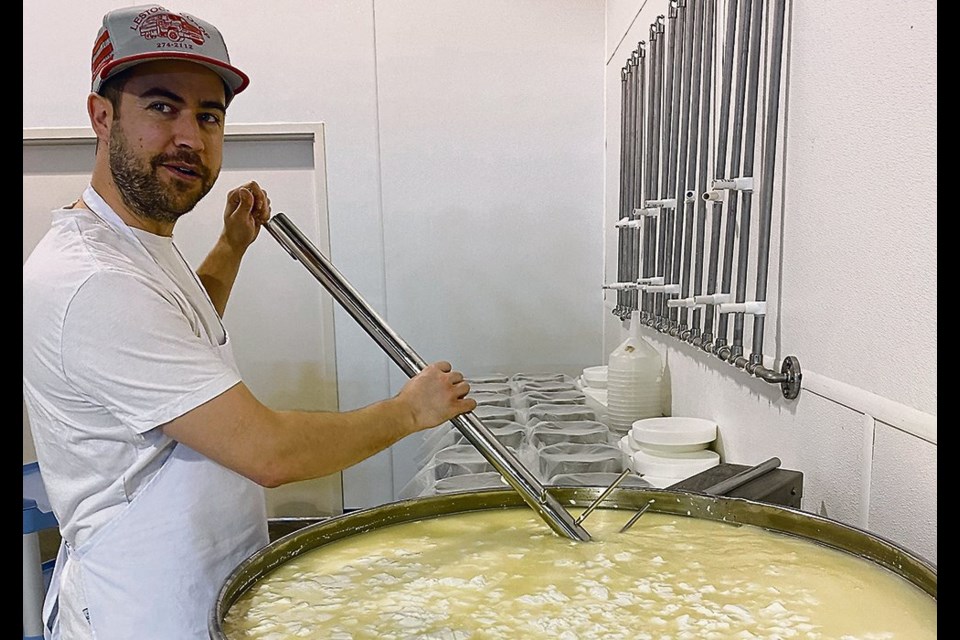OSLER, Sask. — A career in cheese making isn’t for everyone.
But for Kevin Petty, it offers just the right combination of physical activity, artistry and autonomy.
“Actually, it was partly out of frustration with all the desk jobs that I had previously,” says Petty, the founder and owner of based at Osler, Sask.
“Having to go to an office, Monday to Friday, and sit at a desk all day was just killing me. I just wanted to do something a bit more physical and I wanted to have more control over my work.”
Saskatoon Spruce produces hand-made cheese using milk from local dairy producers.
From a 250-litre vat of unpasteurized milk that’s sourced from nearby dairy farms, Petty typically produces 13 wheels of cheese, each weighing approximately two kilograms.
After they’re pressed, salted and aged on spruce boards, the cheese wheels are rubbed with olive and camelina oil, vacuum sealed and distributed to retailers, restaurants and cheese lovers across the province.
“A few years ago, I went to a (buddy’s) wedding in Switzerland… and his dad toured us around to some old-school cheesemakers,” says Petty, originally from Indian Head, Sask.
“It made an impact on me.”
“So, I came home and started making cheeses in my house.”
Today, three years into his career as a professional cheese maker, Petty’s tomme, or mild white cheddar, is earning a reputation among storekeepers, restaurateurs and cheese lovers.
In 2021, Saskatoon Spruce converted roughly 13,000 litres of raw Saskatchewan milk into 1,300 kg of cheese.
Demand for his product is growing.
From an average of about one batch a week in 2021, Petty is on track to double his production in 2022.
His cheese is available at Saskatoon retail outlets.
Direct sales also account for a big slice of the company’s revenue.
“Everything is hand-made so I can only make so much,” says Petty, who also handles marketing duties.
“If I was going really hard, I could make quite a bit more.”
However balancing work with family life, parenting duties and other obligations is important.
Petty acknowledges that his decision to become a cheesemaker was a leap of faith.
After learning the basics through trial and error, he eventually studied under the mentorship of Brother Alberic, a Trappist monk who spent much of his life making cheese at a monastery near Holland, Man., near Brandon.
“I learned a lot from him,” says Petty.
“They don’t have the monastery anymore but I still send him cheese.”
Petty describes cheese making as a simple but finicky process, similar to brewing.
The process starts with fermenting the lactose in milk.
Raw milk is poured into a sterilized vat, along with frozen cultures. The bacterial cultures eat the lactose and produce lactic acid as a byproduct.
This increases the acidity and transforms the milk into a more versatile food type.
Animal rennet is also added to coagulate the milk.
The mixture is then cooked slowly and stirred to a proper consistency before the curds are drained and pressed into wheels.
The pressing process, depending on the cheese maker and the type of cheese being produced, can take up to 12 hours.
Once pressed into circular moulds, the cheese wheels are salted to remove any excess moisture and set aside to age for at least a couple months.
Slight variations during any step in the process can alter the flavour and texture of the product.
The rate at which curds are heated for example, is critically important, Petty says.
At Saskatoon Spruce, curds are heated at a rate of 1 C every six minutes to a maximum temperature of around 37 C.
“Basically, you’re trying to distribute the heat evenly and slowly cook the curds,” he says.
“If you heat them too quickly, you don’t get a good product at the end. It can be very finicky.”
When asked why he decided to pursue an occupation in cheese making, Petty says the occupation combines craftsmanship and creativity.
The opportunity to set his own schedule was also appealing.
“The freedom that comes with it — that was a really big driver for me.”
As an added perk, Petty and his family always have a plentiful supply of delicious hand-made cheese in their refrigerator.
“I figured, everyone is starting craft breweries,” Petty says.
“Why not craft cheese?”




